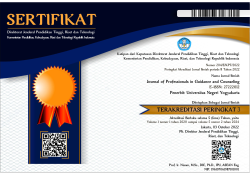The role of family counseling in handling economic problems and family harmony
Downloads
Family economic problems represent a critical factor that can disrupt household harmony and overall well-being. Financial stressors such as income instability, debt, lack of financial management skills, and differing financial values may undermine communication, intensify conflict, and diminish emotional support among family members. This study aims to explore the role of counselors in addressing economic challenges within families and fostering harmony through family counseling. Employing a qualitative approach, data were gathered to capture in-depth perspectives on the impact of economic issues and the interventions provided. Family counseling is viewed as a process that engages all members in identifying problems, enhancing communication, and developing mutually beneficial solutions. Counselors utilize various approaches, including systemic family therapy, narrative methods, and cognitive-behavioral techniques, while integrating financial planning and collaborating with financial experts when necessary. Findings indicate that effective counseling interventions contribute to increased family resilience, improved emotional stability, and strengthened interpersonal relationships, even in the context of severe economic strain. This study underscores the importance of combining psychosocial support with financial guidance to restore harmony, maintain stability, and promote a cohesive, supportive family environment.
Downloads
Amrullah, F., & Alfikri, M. (2022). Implementation of interpersonal communication in maintaining family harmony. LEGAL BRIEF, 11(3), 1962–1966. https://doi.org/10.35335/legal.v11i3.419
Assing-Murray, E., & Lebrun-Harris, L. (2020). Associations between parent-reported family economic hardship and mental health conditions in U.S. children. Journal of Children and Poverty, 26(2), 191–214. https://doi.org/10.1080/10796126.2020.1764188
Bae, S. M. (2020). The relationship between social capital, acculturative stress and depressive symptoms in multicultural adolescents: Verification using multivariate latent growth modeling. International Journal of Intercultural Relations, 74, 127–135. https://doi.org/10.1016/j.ijintrel.2019.11.007
Barnhart, S., Garcia, A. R., & Karcher, N. R. (2022). Adolescent mental health and family economic hardships: The roles of adverse childhood experiences and family conflict. Journal of Youth and Adolescence, 51(12), 2294–2311. https://doi.org/10.1007/s10964-022-01671-9
Demirci, İ. (2022). Family harmony and flourishing in Turkey: The roles of interdependent happiness and harmony in life. Journal of Happiness Studies, 23(3), 985–1005. https://doi.org/10.1007/s10902-021-00437-7
Ennis, E., & Bunting, B. P. (2013). Family burden, family health and personal mental health. BMC Public Health, 13(255).
Gultom, N. D. (2022). Effect of Family Harmony on Teenage Delinquency Behavior Tendency. Acta Psychologia, 1(1), 1-9.
Gupta, E., & Ganguly, O. (2020). Effectiveness of family therapy on poor communication and family relationship: An intervention study. National Journal of Professional Social Work, 21(1), 27–32. https://doi.org/10.51333/njpsw.2020.v21.i1.240
Habib, M. (2020). Faktor ekonomi sebagai alasan perceraian: Studi kasus Pengadilan Agama Klas 1 B Stabat tahun 2019 [Economic factors as reasons for divorce: A case study at the Stabat Class 1B Religious Court in 2019]. AsSyar’i: Jurnal Bimbingan & Konseling Keluarga, 2(2), 253–261. https://doi.org/10.47467/as.v2i2.736
Hadi, S., Putri, D. W. L., & Rosyada, A. (2020). Disharmoni keluarga dan solusinya: Perspektif family therapy [Family disharmony and its solutions: A family therapy perspective]. Tasâmuh, 18(1), 114–137. https://doi.org/10.20414/tasamuh.v18i1.1761
Kaiser, T., & Laireiter, A. R. (2021). Financial socialization and financial literacy in children and adolescents: A review of research and recommendations for practice. Journal of Family and Economic Issues, 42(1), 1–19. https://doi.org/10.1007/s10834-020-09694-9
Marie, N., & McClanahan, S. (2012). Family structure, parental practices and high school completion. American Sociological Review, 56(3).
Masarik, A. S., & Conger, R. D. (2017). Stress and child development: A review of the Family Stress Model. Current Opinion in Psychology, 13, 85–90. https://doi.org/10.1016/j.copsyc.2016.05.008
Mubarok, Achmad, 2009, Psikologi Keluarga: Dari Keluarga Sakinah Hingga Keluarga Bangsa, Jakarta: Wahana Aksara Prima.
Prabhakar, V., & Jayant, S. (2022). Human development & social dynamics (Revised ed.). Dominant Publishers and Distributors (P) Ltd.
Prismadianto, G., Endrawati, L., & Putra, F. (2025). The importance of educational attainment and premarital counseling in building family harmony and preventing domestic violence to strengthen national resilience. Tafkir: Interdisciplinary Journal of Islamic Education, 6(2), 305–321. https://doi.org/10.31538/tijie.v6i2.1324
Putri, J. E., Mudjiran, M., Nirwana, H., & Karneli, Y. (2022). Peranan konselor dalam konseling keluarga untuk meningkatkan keharmonisan keluarga [The role of counselors in family counseling to improve family harmony]. Journal of Counseling, Education and Society, 3(1), 28–31. https://doi.org/10.29210/08jces189000
Rashid, M. H.-U., Rahman, M. A., Hasan, M. I., & Rahman, M. M. (2020). Educational psychology impact on primary education: A review. Journal of Research in Humanities and Social Science, 8(12).
Repond, G., Darwiche, J., & Antonietti, J.-P. (2024). Unlocking family harmony: Coparenting as a moderator of parenting and stepparenting difficulties on children’s adjustment. Family Transitions, ?(?), Article 2430924. https://doi.org/10.1080/28375300.2024.2430924
Saputra, A. J., Sinthia, R., Pangat, A. M., & Chalidaziah, W. (2023). Konseling keluarga untuk mewujudkan keharmonisan rumah tangga. Syifaul Qulub: Jurnal Bimbingan dan Konseling Islam, 4(1), 54–63. https://doi.org/10.32505/syifaulqulub.v4i1.6489
Syam, H., Fasmawati, R., & Sonia, S. (2025). Pendekatan-pendekatan konseling keluarga. RISOMA: Jurnal Riset Sosial Humaniora dan Pendidikan, 3(4), 145–151. https://doi.org/10.62383/risoma.v3i4.835
Ulfiah, 2021. Konseling Keluarga untuk Meningkatkan Ketahanan Keluarga. Jurnal Ilmiah Psikologi, Indonesia.
Windarwati, H. D., Budiman, A. A., Nova, R., Ati, N. A. L., & Kusumawati, M. W. (2020). The relationship between family harmony with stress, anxiety, and depression in adolescents. Jurnal Ners, 15(2), 185–193. https://doi.org/10.20473/jn.v15i2.21495
Yanti, N. (2020). Mewujudkan keharmonisan rumah tangga dengan menggunakan konseling keluarga [Realizing household harmony through family counseling]. AlIttizaan: Journal of Bimbingan Konseling Islam, 3(1), 8–13. https://doi.org/10.24014/0.8710152
Yudiyasiwi, F. R., & Anganthi, N. R. N. (2024). The role of family harmony, emotion-focused coping, stressful life events on nonsuicidal selfinjury behavior in adolescents. Jurnal Ilmiah Psikologi Terapan, 12(1), 60–68. https://doi.org/10.22219/jipt.v12i1.29766
Zhan, Q., & Wang, Q. (2021). The development of the College Students’ Experience of Family Harmony Questionnaire (CSEFHQ). Frontiers in Psychology, 12, Article 658430. https://doi.org/10.3389/fpsyg.2021.658430 SciSpace+11
Zhang, X., Krishnakumar, A., & Narine, L. (2020). Family economic hardship and child outcomes: Test of family stress model in the Chinese context. Journal of Family Psychology, 34(8), 960–968. https://doi.org/10.1037/fam0000670
Copyright (c) 2025 ProGCouns: Journal of Professionals in Guidance and Counseling

This work is licensed under a Creative Commons Attribution-ShareAlike 4.0 International License.
 | ProGCouns: Professional Guidance and Counseling Journal is licensed under a Creative Commons Attribution-ShareAlike 4.0 International License. |















